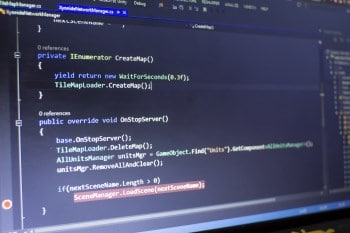16 Tips on How to Improve Your Coding Skills

A lot of skills are needed to make a good software developer: management, communication, teamwork, coding skills, etc.
While it takes time and experience to improve all these skills; impressive coding skills are required from software developers at all levels.
It is expected of all software developers to be good coders regardless of the years of experience, but skills such as project management skills are often considered based on the developer’s experience.
So how do you improve your coding skills? The list is quite endless, and there are lots of opinions out there; methods vary.
In this article, you’ll get to see some tips for improving your coding skills that apply across-the-board. These tips will not get you from a beginner developer to the mythical “10X developer” in one week. It’ll take time, so you’ll need consistency and patience.
Here’s a list of the 16 amazing tips you’ll learn about in the rest of this article:
- Debug With Print Statements
- Master Your IDE
- Read the Kind of Code You’ll Love to Write
- Learn Test Driven Development
- Master Your Language
- Teach What You Learn
- Read Books on Coding Practices
- Take a 100 Days of Coding Challenge
- Learn Another Programming Language
- Study Design Patterns
- Take Part in Code Reviews
- Work on Exciting Projects
- Engage in Pair Programming
- Think Twice, Code Once
- Learn the Art of Writing Documentation
- Get Involved in the Open Source Community
1. Debug With Print Statements
As you get better at coding, you’ll begin to find better ways of debugging your code. One of the best tools for debugging is making use of your language’s print statement to track errors.
Using print statements at strategic points in the code helps you track how data is being used in the code and see where problems are coming from.
Calling methods that do not exist on an object leads to errors, but you’ll find out that you make the mistake of doing this often.
It is not a sign of you being a lousy coder; it just often happens that code doesn’t work the way you expect mostly due to knowledge gaps. You can use a print statement at strategic points in the code to see where the issue is coming from and debug without hassle.
2. Master Your IDE

As you grow in your career, time management begins to become more paramount, and you’ll have to use the best tools possible to get the job done.
Tools are essential to software developers, and it is no surprise to see new tools being released to make life easier for other developers.
The IDE is an essential tool for any developer; hence you need to master it. If possible, memorize all the shortcuts and know all about the IDE.
Mastering your IDE will help you improve your coding skills over time as it’ll make you more efficient and help you keep your focus on coding activities at all times.
It doesn’t have to be an IDE in this case; if you’re more comfortable with using an editor like Sublime Text or VIM or a notebook like Jupyter Notebook, master the commands, and things will become easier.
3. Read the Kind of Code You’ll Love to Write
Having the hunger to write better code is crucial to writing better code; this way when you see the type of quality you crave to write, you’ll recognize it.
As a software developer, you’ll spend more time reading code than actually writing code, so you should invest time in reading top quality code.
When you read great code, you’ll see the flaws in the code you write and can improve on them.
“If you don’t have time to read, you don’t have the time (or the tools) to write. Simple as that.”
Stephen King
The quote above refers to writers, and it applies to people who write code too. If you don’t read code, you can’t write code.
4. Learn Test Driven Development
Test Driven Development is a method of software development where tests are written before the actual code. Writing tests ensures that you write less buggy code which in turn improves your confidence as a software developer.
Code without tests is bad code according to Michael Feathers the author of Working Effectively with Legacy Code. Many software developers agree with this line of thought, and it’s proof of the importance of tests in software development.
When you learn to write tests, you’ll begin to see code from a different perspective and become a better software developer.
5. Master Your Language
Code is written in programming languages; so to get better at coding you need to master a programming language.
When you become comfortable writing in your most used programming language, you’ll be able to understand its flaws and will write much better code.
Mastering a programming language reduces the conscious effort you make at writing correct language syntax. Coding in a language that is like second nature allows you to worry about other aspects of the code instead of being concerned with language syntax.
It’s like eating; you don’t have to think about your hand’s movement as the spoon goes from the plate to your mouth; it’s second nature, and you can easily do other tasks while eating.
6. Teach What You Learn
One of the best ways to become better at coding is to teach it; this applies to different areas of life, and it applies to writing code as well.
When you learn a new coding concept, either it’s language based such as how to create a function in X language or concept based such as how to implement recursion, you can understand it better by teaching.
One fear that keeps developers from teaching is the thought of not knowing enough, but you do not need to know a lot to teach.
Since the point of teaching what you learn is to get better, you are open to learning from others and becoming a better coder in the process.
You can teach through various means, either physically to other coders or remotely by writing articles or creating tutorial videos.
7. Read Books on Coding Practices

In one of the earlier points, you learned that reading code is essential to writing code. To improve your coding skills, you may also have to read books on best coding practices.
Experience is the best teacher they say, but by reading books, you can learn quickly without having to go the route of having experience.
When you read books on best coding practices, you’ll get to see the best techniques for writing great code and tips on how to do this.
What makes this golden is that the writers are usually sharing their tips based on their experiences as software developers, so you can be sure that the tips are immediately applicable to coding activities and will help you improve.
8. Take a 100 Days of Coding Challenge
Becoming better at coding is a challenge; what better way to improve coding skills than challenging yourself?
One hundred days of coding challenges are popular amongst beginner programmers, but they can be embarked upon by anyone regardless of the level of experience.
When you take such challenges, you force yourself to write code everyday and create some level of consistency when it comes to coding.
In this time, you’ll get to work on coding challenges and build exciting projects that you’ll be proud of and can add to your portfolio.
Coding is driven by dedication, perseverance, and consistency; hence a 100 days of coding challenge will make you rely on those virtues and improve your coding skills.
9. Learn Another Programming Language
Programming languages are created for various reasons such as the need for new features, improved speed, different design patterns, and new programming paradigms.
While it is important to master one programming language, learning another can provide a shift in your thought process.
For example, if you’ve been coding in Java all your life, you’ll be accustomed to writing code based on Object-Oriented Programming (OOP) paradigms. But when you learn to write code in a functional programming language like Haskell, your thought process will change.
Learning a new programming language will improve your coding skills, and you do not have to master the newly-learned language like you mastered your primary programming language.
The exposure to a new programming language will help you become a better programmer, improve how you communicate with other programmers and most importantly, improve your coding skills.
10. Study Design Patterns
Design patterns are solutions to commonly recurring problems. These solutions are not new; however, they have become popular since the release of the famous “Gang of Four” book, Design Patterns: Elements of Reusable Object-Oriented Software.
When you study design patterns and can apply them correctly to problems, you’ll be able to write better code as the solutions are proven to be effective.
Since design patterns are now universal in some way, you’ll be able to communicate with other software developers using terms associated with design patterns.
11. Take Part in Code Reviews
Writing code can be considered to be an art; you may not be able to tell how good or bad it is yourself.
Code reviews involve other software developers checking out your code and giving their opinion about it. This way, you can easily figure parts of your code that you can write better.
It’s not just about other developers reviewing your code; you should also review other developer’s code. This way you can see how other developers write code, identify poorly written code so you can avoid writing that way and also identify well-written code that you’ll want to emulate in the future.
One of the major points of being involved in code reviews is to share knowledge and become better at writing quality code.
12. Work on Exciting Projects
One of the best ways to get better at writing code is to write more code, but writing code without any form of motivation can be tedious.
Working on projects helps you to write code while building software that can be useful to people and also improve your coding skills at the same time.
You can look for exciting projects you’ll like to work on, and it doesn’t have to be the next world-changing technology; it only has to be interesting enough for you to commence and work on it to completion.
If you’re struggling to find project ideas, check out the resources section at the end of this article, you’ll find links to fantastic project ideas.
13. Engage in Pair Programming

Pair programming is a system of programming where two developers work on code using the same machine; they have a mouse and a keyboard and one “drives” the code with the other observes and “navigates” the code as it is typed in.
This practice reduces the number of errors in the code and can help in fostering a great relationship between two developers.
Most importantly, it helps both parties get better at writing code because they can share knowledge during the process and brainstorm about the best way to write code.
There can be different kinds of pairs: expert-expert, expert-novice and novice-novice.
You’ll often have to change roles between being a driver and an observer, so it becomes a much more fun-filled experience, and you become a better coder at the end of the day.
14. Think Twice, Code Once
You write code to get better at writing code, but that’s not always the case.
It’s vital that you don’t write code blindly, else you’ll only get better at writing code wrongly.
When you begin writing code without thinking, you’ll end up writing buggy or needless code on many occasions. You may gain some form of experience writing the deleted code, but it’ll count as lost time regardless and will harm the project in the long run.
Great coders think about the problem at hand and ask the right questions before getting to write code at all; beginner programmers may not understand this completely, but it’ll be more apparent over time.
15. Learn the Art of Writing Documentation
Many developers consider the writing of documentation to a job for technical writers alone, but this is misleading.
Everyone involved in a project should be involved in the documentation. Coders do not have to become masters at writing documentation, but skills on the scale of average to good will be useful.
Getting involved in writing documentation helps you become considerate when coding; you’ll begin to comment code properly and write better functions or methods.
Software developers with some experience writing documentation tend to write better code, as they are likely to be more considerate of other individuals who will need to implement the code.
16. Get Involved in the Open Source Community
Working on projects can help you get better at coding, but sometimes you want to collaborate with others on a project; open source projects give you the avenue to do this.
Many open source projects have laid down standards to ensure that quality code is written at all times; this forces you to improve the quality of the code you write, making you a better coder in the process.
Working on open source projects also gives the fulfillment of doing work that can be used by people; the joy that comes with seeing people benefit from a feature you come up with is endless.
You can contribute to open source projects by writing code, documentation, debugging and resolving issues; it’s a proven way to improve your skills as a software developer.
Resources
These are resources that can help you commence on your journey to improving your coding skills; they were carefully selected and will be very useful.
- A Brief Introduction to Test Driven Development
- Three Books Every Clean Code Developer Should Read
- The 100 Days of Code Challenge
- .Net Design Patterns—Applicable to All Languages
- A Playlist of Object-Oriented Design Patterns
- A List of 1000 Software Agnostic Projects
- A Beginners Guide to Writing Documentation
- Find Open Source Projects
Conclusion
You can improve your coding skills through various means, but it all comes down to consistency, dedication, and perseverance.
Coding challenges, pair programming, learning new programming languages and working on exciting project are some of the effective ways to get better at coding discussed in this article.
It’s not just about reading articles though; you need to implement the tips discussed and be patient to see the results.
Get working, and become the best software developer you can be.







